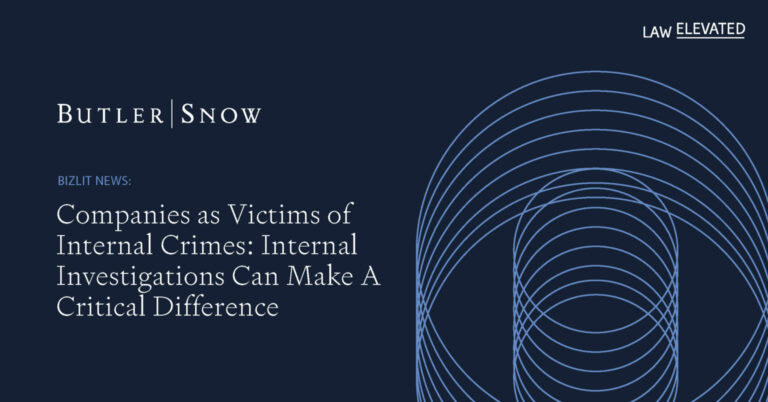For corporate entities across the entire spectrum—small, medium and (especially) large, both closely held and publicly traded—a virtually unavoidable reality is not if the company will be a victim of an internal crime, but when and how damaging the result will be. In effecting prevention, mitigation or “damage control” in order to limit and deter company representatives and employees from preying on the company with impunity, what can companies as a practical matter do?
As a former (30 years) career federal prosecutor, now in our Butler Snow LLP Government Investigations, Compliance and White Collar section, we increasingly find and seize opportunities to meaningfully assist our corporate clients by working closely with company leadership, security, and in-house counsel by responding to early warnings and “red flags” which may indicate unethical conduct, as well as outright wholesale theft and in some cases, worse.
First, conducting internal investigations before offending corporate personnel can place the entire company and its leadership at risk with undetected large scale criminal conduct (including in some cases bribery and kickbacks involving U.S. or foreign officials)—is of inestimable value in ensuring that it’s the company, and not federal or state criminal investigators which initiate the action…which in turn means that the company is in a position to refer crimes for investigation and possible criminal prosecution, rather than having to call in outside counsel to navigate onerous and time-consuming responses to sweeping grand jury subpoenas duces tecum in already-existing criminal investigations. Additionally, company outside counsel conducting interviews with both company and outside witnesses will help to keep the company apprised of the scope, severity, and effect of any offending conduct—which in turn can provide invaluable information, evidence and leads permitting the company (with advice of counsel) to make an intelligent, measured decision regarding:
- Whether in the absence of significant criminal conduct, sanctions or termination of offender(s) is warranted;
- In the case of the investigative process revealing significant criminal conduct—especially implicating harm or egregious external criminal conduct as public bribery—whether company self-reporting is appropriate in order to establish and maintain corporate integrity; or
- In situations revealing significant company losses, harm, or extensive, complex financial, cyber or intellectual property schemes—amassing adequate evidence to get the attention of federal agents and U.S. Attorneys’ offices, and providing enough groundwork to trigger the institution of and meaningful assistance to, a full criminal investigation.
In the third scenario, while both the passage of time and the fact that in many if not most cases, significant restitution upon criminal conviction does not predictably result in the victim’s recovery of losses—it is important to note that in some cases it however does. The fact remains that the commitment of knowledgeable outside corporate counsel in the timely and swift identification of the offenders—as well as their ways, means and methods—can go a long way to help in the identification and possible restitution recovery of stolen funds—as well as the equally critical factor of the company leading, instead of responding to, a complex criminal investigation profoundly affecting it.
